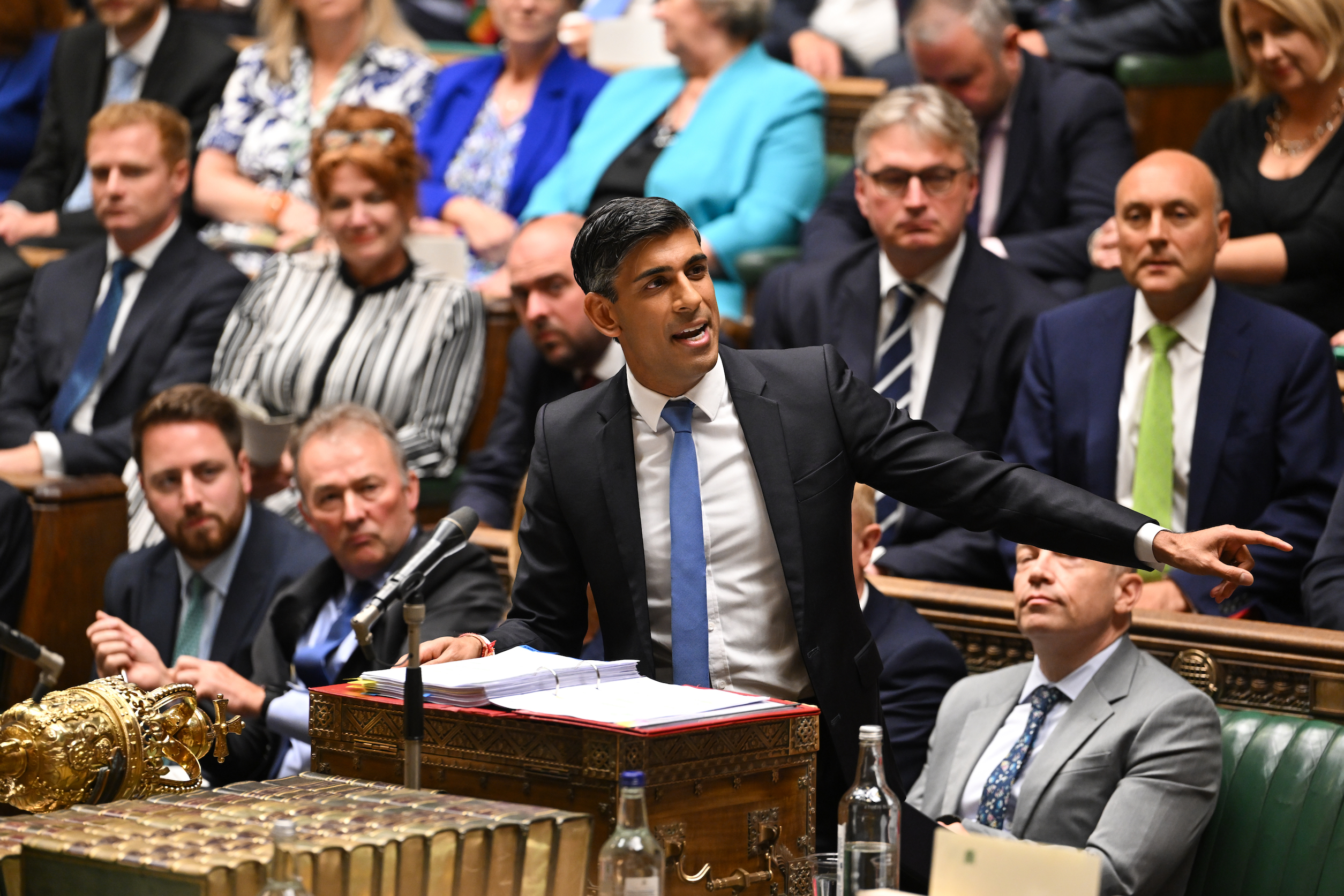With news this morning that the UK’s GDP had contracted by 0.5 per cent in July you might have expected Keir Starmer, who as Labour leader has insisted the UK needs “growth, growth, growth”, to focus his PMQs questions on Britain’s perennial economic woes.
But the Labour leader opted to place his flagship “mission” to one side this afternoon, as he weaved a web of bad news stories, focussing variously on Daniel Khaliffe’s prison escape, China, small boat crossings and Raac in schools.
Majoring on a myriad of talking points at PMQs is often derided as “scattergun” and unfocussed. After all, how can six disparate lines of questioning seize the news agenda? But in so far as Labour’s messaging around “broken Britain” goes, it made for a compelling performance. And Starmer’s trademark analytic antipathy culminated in a glossy new nickname: “inaction man” (unavailable in all good retail stores).
We have experienced a steady stream of PMQs nicknames in recent years. On this, Boris Johnson was a master of the craft: he blasted Starmer as a “human bollard” and “captain hindsight” (Sunak revived this latter moniker last week). The “political nickname” is in some senses a singularly Trumpian tactic (see “crooked Hillary” or “sleepy Joe”), as a politician seeks to make an opponent’s trait stick in the collective consciousness of the public.


But the art of the political nickname naturally presages the former President. John Smith memorably blasted John Major as the man with the “man with the non-Midas touch” in the 1990s; and Dennis Skinner caused quite the parliamentary ruckus when he declared Cameron “dodgy Dave” in 2016. As for Theresa May, she was the “Maybot”.
When it comes to curating a good political nickname, there are a few pointers worth keeping in mind: alliteration helps, humour is essentially obligatory; but what a nickname has to do, above all else, is ring true.
When Smith labelled Major the “man with the non-Midas touch” it pulled on a common thread, resurgent today, that everything was going wrong for the then-PM. Trump’s “crooked Hillary” tapped into a general view of Washington corruption. And dodgy Dave seized on Cameron’s perceived cronyistic tendencies. “Maybot” spoke for itself.
So how does “inaction man” fare compared to its punny predecessors?
In his first PMQ, Starmer queried Sunak on the escape of Daniel Khaliffe, and the particular point about why the terror suspect was not held in category A prison. It prompted a stock answer from Sunak: he said the government has commissioned investigations to make sure lessons are learned from the case so “that it never happens again”. No immediate action was promised.
The Labour leader used his second question to lean into a more political point. “It beggars belief we are here again”, he said, referring to probation failures that led to the death of Zara Aleena, adding that the chief inspector of prisons said conditions in Wandsworth were so bad it should be shut down. He accused Sunak of presiding over “mayhem” in the criminal justice.
Sunak then decided that lecturing the former Director of the Public Prosecutions on criminal justice was a good idea. He said Starmer “should know better” and that staffing at Wandsworth prison is up by 25 per cent in the past six years.
Starmer pivoted to China. He asked whether the foreign secretary had raised the case of the alleged “spy” parliamentary researcher when he visited China. Sunak tried to give the impression he did — albeit without deploying that most difficult of words: “yes”.
“Will he finally commit to a full audit of UK-China relations?”, Starmer probed next. It goes unanswered as the prime minister explains how Sir Keir was “100 per cent” behind Jeremy Corbyn who wanted to “abolish the army”. Again, no immediate action promised.
It was on these terms that Starmer saw fit to label Sunak “inaction man”, accusing him of failing to heed warnings and blaming others for the consequences of his actions. (Sunak, ironically, did not respond to Starmer’s “inaction man” jibe. But Rishi Sunak’s official spokesperson told journalists in the post-PMQs huddle that Sunak is, in fact, “a man of action”).
Starmer then pointed out that in the past year 40,000 people have crossed the channel in small boats. He argued the PM has failed to stop terrorists strolling out of prison, failed to protect Britain against hostile states and failed to stop the boats. “How can anyone trust him to run the country?”, he exclaimed.
What is troubling for the prime minister is that this increasingly prevailing view runs directly counter to the one he sought to engender in January. At the start of 2023, Rishi Sunak began his year with a round of ruthlessly pragmatic oath swearing. Promising to halve inflation, grow the economy, reduce debt, cut NHS waiting lists and “stop the boats”, the prime minister claimed he was pronouncing the “people’s priorities”.
The pledges were the essential Sunakian pitch. The PM planned to bore Britain with a record of delivery so undeniable, so straightforward that the public would be forced to reward his party with an unprecedented fifth term.
But what we see now is arguably this strategy’s logical antithesis: a zombie government (to use Nadine Dorries’ phrase), careering aimlessly from one uncomfortable news day to the next. Boris Johnson once called the Labour leader a “permanent spectator” — this is, in essence, the same charge Starmer levies at his successor-but-one.
Sunak finished by defending his government, which he said in the past week has announced a landmark deal for British scientists and attracted £500m for the auto industry. He also accused Starmer of being “locked away with Labour’s union paymasters” while the Conservatives are working for the “hardworking British public”. It won’t cut through like “inaction man” will.
PMQs Verdict: Starmer 5, Sunak 1.
Josh Self is Editor of Politics.co.uk, follow him on Twitter here.
Politics.co.uk is the UK’s leading digital-only political website, providing comprehensive coverage of UK politics. Subscribe to our daily newsletter here.












